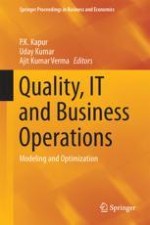2018 | OriginalPaper | Buchkapitel
Testing Time and Effort-Based Successive Release Modeling of a Software in the Presence of Imperfect Debugging
verfasst von : Vijay Kumar, P. K. Kapur, Ramita Sahni, A. K. Shrivastava
Erschienen in: Quality, IT and Business Operations
Verlag: Springer Singapore
Aktivieren Sie unsere intelligente Suche, um passende Fachinhalte oder Patente zu finden.
Wählen Sie Textabschnitte aus um mit Künstlicher Intelligenz passenden Patente zu finden. powered by
Markieren Sie Textabschnitte, um KI-gestützt weitere passende Inhalte zu finden. powered by
